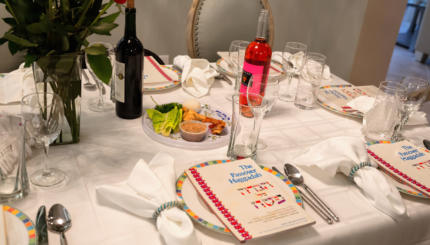Passover 2016 begins Friday evening, April 22, and ends Saturday evening, April 30. The first Passover is on the evening of Friday, April 22, and the second Passover seder takes place on the evening of Saturday, April 23.
What is Passover?
Passover is a festival of freedom.
It commemorates the Israelites’ Exodus from Egypt, and their transition from slavery to freedom. The main ritual of Passover is the seder, which occurs on the first night (or, outside of Israel, the first two nights) of the holiday — a festive meal that involves the re-telling of the Exodus through stories and song and the consumption of ritual foods, including matzah and maror (bitter herbs).
What are some Passover practices?
The central Passover practice is a set of intense dietary changes, mainly the absence of hametz, or foods with leaven. (Ashkenazi Jews also avoid kitniyot, a category of food that includes legumes.) In recent years, many Jews have compensated for the lack of grain by cooking with quinoa. The ecstatic cycle of psalms called Hallel is recited both at night and day (during the seder and morning prayers). Additionally, Passover commences a 49-day period called the Omer, which recalls the count between offerings brought to the ancient Temple in Jerusalem. This count culminates in the holiday of Shavuot, the anniversary of the receiving of the Torah at Sinai.

Help us keep Jewish knowledge accessible to millions of people around the world.
Your donation to My Jewish Learning fuels endless journeys of Jewish discovery. With your help, My Jewish Learning can continue to provide nonstop opportunities for learning, connection and growth.
What foods do we eat on Passover?
Matzah, or unleavened bread, is the main food of Passover. You can purchase it in numerous stores, or you can make your own. But the holiday has many traditional, popular foods, from haroset (a mixture of apples, nuts, wine, and cinnamon) to matzah ball soup — and the absence of leavening calls upon a cook to employ all of his/her culinary creativity.


